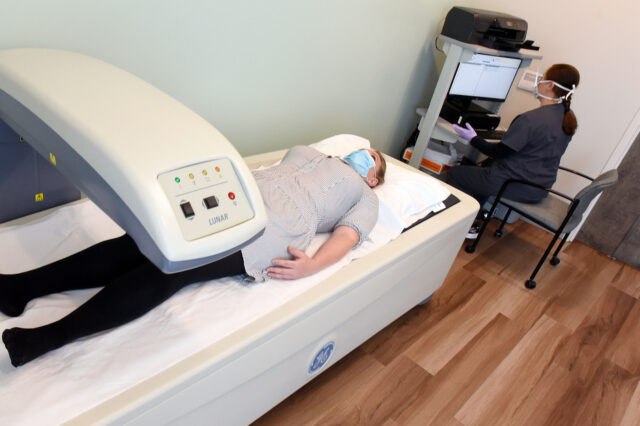The Discovery dual-energy X-ray absorptiometry (DEXA or DXA scan) system provides a single, comprehensive platform for the assessment of three major health issues:
- Osteoporosis including vertebral fracture assessment
- Cardiovascular disease
- Obesity
Some of the risk factors of patients who should be tested by DEXA are as follows:
- Early menopause, surgical menopause
- Low body weight compared to height
- Diet - low intake of milk products and lack of vitamin D
- Lifestyle factors like cigarette smoking, caffeine, alcohol abuse, lack of exercise
- Drugs and diseases, corticosteroid treatment, hyperthyroidism, anorexia nervosa, amenorrhoea, arthritis
- Genetic factors like family history, race
Frequently Asked Questions
What is osteoporosis?
Osteoporosis is a condition characterized by low bone mass and structural deterioration of bone tissue, leading to bone fragility and an increased susceptibility to fractures, especially of the hip, spine and wrist, although any bone can be affected. Breaks may occur anywhere from a minor fall to a daily action of a sneeze or bump into furniture.
What are the benefits of bone density testing?
- Early detection of bone loss and monitoring of therapeutic effectiveness
- Measurement of axial skeletal sites where potential early bone loss may occur
- Highest precision of <1.0%
- Low radiation dose for patient imaging with high resolution
How do I make an appointment of my bone density (DXA) screening and how much does it cost?
Patients will need a prescription from your healthcare provider to schedule a DXA scan which can be your regular primary care provider, gynecologist or another specialist who may want to refer you for the screening. The DXA screening should be performed every two years for post-menopausal women unless otherwise recommended by your physician. This screening is typically covered by most insurance carriers, however patients should check regardless of your coverage prior to scheduling the screen.

